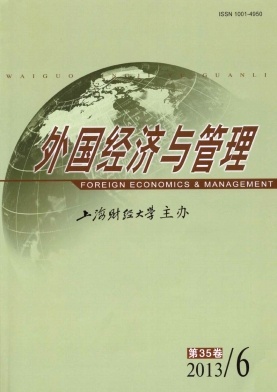国外企业高管薪酬税收规制述要与启示
外国经济与管理 2013 年 第 35 卷第 06 期, 页码:33 - 42
摘要
参考文献
摘要
综观国外企业高管薪酬规制实践,不难发现税收一直扮演着重要角色。当前,加强对国企高管等高收入者的税收调节已成为深化我国收入分配制度改革的一个重要议题。本文通过文献梳理,对国外企业高管薪酬税收规制的主要路径与实践效果进行了评析,并在此基础上指出了加强和完善我国国企高管薪酬税收调节的建议。
[1]Balsam S and Yin Q J.Exploring firm willingness to forfeit tax deductions under internal revenue code section162(m):The million-dollar cap[J].Journal of Accounting&Public Policy,2005,24(4):300-324.
[2]Bebchuk L and Fried J.Executive compensation as an agency problem[J].Journal of Economic Perspectives,2003,17(3):71-92.
[3]Chason E D.Executive compensation and tax neutrality:Taxing the interest component of deferred compensation[J].Cardozo Law Revtew,2010,31(5):1667-1716.
[4]Conyon M J and He L.CEO compensation and corporate go-vernance in China[J].Corporate Governance:An International Review,2012,20(6):575-592.
[5]Davis K R.Taking stock─Salary and options too:The looting of corporate America[J].Maryland Law Review,2010,69(3):419-500.
[6]Dhaliwal D,et al.Taxes and the backdating of stock option ex-ercise dates[J].Journal of Accounting and Economics,2009,47(1/2):27-49.
[7]Difilipo M.Regulating executive compensation in the wake of the financial crisis[J].Drexel Law Review,2009,2(1):258-312.
[8]Doran M.Executive compensation reform and the limits of tax policy[R].Working Paper,The Urban Institute,2004.
[9]Ehrlich M V and Radulescu D.The taxation of bonuses and its effect on executive compensation and risk-taking─Evidence from the UK experience[R].Working Paper,ETH,Zurich,2012.
[10]Ferris K R and Wallace J S.IRC Section162(m)and the lawof unintended consequences[J].Advances in Accounting,in-corporating Advances in International Accounting,2009,25(2):147-155.
[11]Frydman C and Molloy R S.Do tax policy affect executive compensation?Evidence from postwar tax reforms?[R].Working Paper,NBER,2011.
[12]Goolshee A.What happens when you tax the rich?Evidence from executive compensation[J].Journal of Political Econo-my,2000,108(2):352-378.
[13]Graham H R,et al.Employee stock options,corporate taxes,and debt policy[J].Journal of Finance,2004,LIX(4):1585-1618.
[14]Hall B J and Liebman J B.The taxation of executive compen-sation[J].Tax Policy and the Economy,2000,14(1):1-44.
[15]Harris D G and Livingstone J R.Federal tax legislation as an implicit contracting cost benchmark:The definition of exces-sive executive compensation[J].Accounting Review,2002,77(4):997-1018.
[16]Heen K P.The billion dollar gaps:Revisiting section162(m)[R].Working Paper,University of Mannheim,2010.
[17]Hu F and Monem R.Unintended consequences of capping CEO compensation:Evidence from China’s state-owned enter-prises[R].Working paper,Griffith University,2012.
[18]Jensen M and Meckling W.Theory of the Firm:Managerial behavior,agency cost,and capital structure[J].Journal of Po-litical Economy,1976,3(2):305-360.
[19]Katuscak,P.Taxes and executive compensation:Evidence from the1990s[J].CESifo Economic Studies,2009,55(3/4):542-568.
[20]Li J and Kothari S P.Effect of personal taxes on managers’decisions to sell stock[J]Journal of Accounting and Econom-ics,2008,46(1):23-46.
[21]Lund A C W.Tax’s triviality as a pay-reforming device[J].Villanova Law Review,2012,57(3):571-588.
[22]Matsunaga S,et al.Disqualifying dispositions of incentive stock options:Tax benefits versus financial reporting costs[J].Journal of Accounting Research,1992,30(3):37-76.
[23]McNeil B J.Nonqualified deferred compensation:General rules and requirements[J].Journal of Pension Planning&Compliance,2008,34(2):55-98.
[24]Mullane J S.Incidence and accidents:Regulation of executive compensation through the tax code[R].Working Paper,Vil-lanova University,2009.
[25]Murphy K.The politics of pay:A legislative history of execu-tive compensation[R].Working Paper,University of Southern California,2011.
[26]Murphy K.Executive compensation:When we are,and how we got there[R].Working Paper,University of Southern Cali-fornia,2012.
[27]Perry T and Zenner M.Pay for performance?Government regulation and the structure of compensation contracts[J].Journal of Financial Economics,2001,62(3):453-488.
[28]Polsky G D.Controlling executive compensation through the tax code[J].Washington and Lee Law Review,2007,64(3):878-925.
[29]Rose N L and Wolfram C.Regulating executive pay:Using the tax code to influence chief executive officer compensation[J].Journal of Labor Economics,2002,20(2):138-172.
[30]Scholes M S,et al.Taxes planning and business strategy:A plan-ning approach[M].(3rd Ed.).Englewood Cliffs,NJ:Prentice-Hall,2005.
[31]Smith T,et al.Do taxes matter?Evidence of individual and corporate tax incentives on the choice to hold shares acquired from exercise of employee stock options[R].Working Paper,2009.
[32]Stabile,Susan J.Is There a role for tax law in policing executive compensation?[J].St.John’s Law Review,1998,72(1):81-102.
[33]Walker D I and Fleischer V.Book/tax conformity and equity compensation[R].Working Paper,Boston University,2008.
[34]Walker D I.A tax response to the executive pay problem[J].Boston University Law Review,2013,93(2):325-387.
[35]Wallace J S,et al.A perspective on regulatory paradigms:The case of IRS and Sarbanes-Oxley approaches to executive compensation-related regulation[J].Research in Accounting Regulation,2009,21(2):111-117.
[36]Yale E and Polsky G D.Reforming the taxation of deferred compensation[J].N.C.Law Review,2007,85(3):571-634.
[37]黄再胜,曹雷.经理薪酬规制研究新进展[J].经济学动态,2011,(8):122-126.
[38]林建秀.税收对经理人股票期权激励效应的影响[J].税务与经济,2011,(3):72-76.
[2]Bebchuk L and Fried J.Executive compensation as an agency problem[J].Journal of Economic Perspectives,2003,17(3):71-92.
[3]Chason E D.Executive compensation and tax neutrality:Taxing the interest component of deferred compensation[J].Cardozo Law Revtew,2010,31(5):1667-1716.
[4]Conyon M J and He L.CEO compensation and corporate go-vernance in China[J].Corporate Governance:An International Review,2012,20(6):575-592.
[5]Davis K R.Taking stock─Salary and options too:The looting of corporate America[J].Maryland Law Review,2010,69(3):419-500.
[6]Dhaliwal D,et al.Taxes and the backdating of stock option ex-ercise dates[J].Journal of Accounting and Economics,2009,47(1/2):27-49.
[7]Difilipo M.Regulating executive compensation in the wake of the financial crisis[J].Drexel Law Review,2009,2(1):258-312.
[8]Doran M.Executive compensation reform and the limits of tax policy[R].Working Paper,The Urban Institute,2004.
[9]Ehrlich M V and Radulescu D.The taxation of bonuses and its effect on executive compensation and risk-taking─Evidence from the UK experience[R].Working Paper,ETH,Zurich,2012.
[10]Ferris K R and Wallace J S.IRC Section162(m)and the lawof unintended consequences[J].Advances in Accounting,in-corporating Advances in International Accounting,2009,25(2):147-155.
[11]Frydman C and Molloy R S.Do tax policy affect executive compensation?Evidence from postwar tax reforms?[R].Working Paper,NBER,2011.
[12]Goolshee A.What happens when you tax the rich?Evidence from executive compensation[J].Journal of Political Econo-my,2000,108(2):352-378.
[13]Graham H R,et al.Employee stock options,corporate taxes,and debt policy[J].Journal of Finance,2004,LIX(4):1585-1618.
[14]Hall B J and Liebman J B.The taxation of executive compen-sation[J].Tax Policy and the Economy,2000,14(1):1-44.
[15]Harris D G and Livingstone J R.Federal tax legislation as an implicit contracting cost benchmark:The definition of exces-sive executive compensation[J].Accounting Review,2002,77(4):997-1018.
[16]Heen K P.The billion dollar gaps:Revisiting section162(m)[R].Working Paper,University of Mannheim,2010.
[17]Hu F and Monem R.Unintended consequences of capping CEO compensation:Evidence from China’s state-owned enter-prises[R].Working paper,Griffith University,2012.
[18]Jensen M and Meckling W.Theory of the Firm:Managerial behavior,agency cost,and capital structure[J].Journal of Po-litical Economy,1976,3(2):305-360.
[19]Katuscak,P.Taxes and executive compensation:Evidence from the1990s[J].CESifo Economic Studies,2009,55(3/4):542-568.
[20]Li J and Kothari S P.Effect of personal taxes on managers’decisions to sell stock[J]Journal of Accounting and Econom-ics,2008,46(1):23-46.
[21]Lund A C W.Tax’s triviality as a pay-reforming device[J].Villanova Law Review,2012,57(3):571-588.
[22]Matsunaga S,et al.Disqualifying dispositions of incentive stock options:Tax benefits versus financial reporting costs[J].Journal of Accounting Research,1992,30(3):37-76.
[23]McNeil B J.Nonqualified deferred compensation:General rules and requirements[J].Journal of Pension Planning&Compliance,2008,34(2):55-98.
[24]Mullane J S.Incidence and accidents:Regulation of executive compensation through the tax code[R].Working Paper,Vil-lanova University,2009.
[25]Murphy K.The politics of pay:A legislative history of execu-tive compensation[R].Working Paper,University of Southern California,2011.
[26]Murphy K.Executive compensation:When we are,and how we got there[R].Working Paper,University of Southern Cali-fornia,2012.
[27]Perry T and Zenner M.Pay for performance?Government regulation and the structure of compensation contracts[J].Journal of Financial Economics,2001,62(3):453-488.
[28]Polsky G D.Controlling executive compensation through the tax code[J].Washington and Lee Law Review,2007,64(3):878-925.
[29]Rose N L and Wolfram C.Regulating executive pay:Using the tax code to influence chief executive officer compensation[J].Journal of Labor Economics,2002,20(2):138-172.
[30]Scholes M S,et al.Taxes planning and business strategy:A plan-ning approach[M].(3rd Ed.).Englewood Cliffs,NJ:Prentice-Hall,2005.
[31]Smith T,et al.Do taxes matter?Evidence of individual and corporate tax incentives on the choice to hold shares acquired from exercise of employee stock options[R].Working Paper,2009.
[32]Stabile,Susan J.Is There a role for tax law in policing executive compensation?[J].St.John’s Law Review,1998,72(1):81-102.
[33]Walker D I and Fleischer V.Book/tax conformity and equity compensation[R].Working Paper,Boston University,2008.
[34]Walker D I.A tax response to the executive pay problem[J].Boston University Law Review,2013,93(2):325-387.
[35]Wallace J S,et al.A perspective on regulatory paradigms:The case of IRS and Sarbanes-Oxley approaches to executive compensation-related regulation[J].Research in Accounting Regulation,2009,21(2):111-117.
[36]Yale E and Polsky G D.Reforming the taxation of deferred compensation[J].N.C.Law Review,2007,85(3):571-634.
[37]黄再胜,曹雷.经理薪酬规制研究新进展[J].经济学动态,2011,(8):122-126.
[38]林建秀.税收对经理人股票期权激励效应的影响[J].税务与经济,2011,(3):72-76.
引用本文
黄再胜. 国外企业高管薪酬税收规制述要与启示[J]. 外国经济与管理, 2013, 35(6): 33–42.
导出参考文献,格式为:





 6974
6974  602
602

